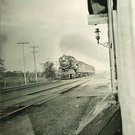Learning about history can lead to interesting reflection on today
To the Editor:
To propel the millions of cars and trucks that swarm Route 20 every day, everyone needs gas. Gas with fumes that are slowly killing us and killing the environment. But it hasn’t always been that way. It used to be that everyone needed hay to get around. Hay!
Hay is what fueled the thousands and thousands of horses that pulled the carriages that moved people up and down the Western Turnpike and from place to place all over Guilderland. And one of the distribution hubs of the local hay trade was the tiny hamlet of Fullers Station on Route 20.
But Fullers wasn’t always so tiny!
“There was a time when Fullers needed no historical marker,” is the next presentation of the Guilderland Historical Society — at 7:30 p.m. on Thursday, Sept. 21, at the Mynderse-Frederick House, 451 Route 146, Guilderland Center.
Everybody knew Fullers, everybody talked about Fullers, and Fullers was a magnet of commerce. A frequent entry in the Henry J. Wemple diaries (in the collection of Altamont antiquarian Jerry Oliver) would mention Fullers something like this: “Cloudy day. I went twice to Foolers station with hay” (May 6, 1884).
Henry was only 15 years old when he began to keep his diaries, so we can’t fault him for sounding it out wrong — nor did it take him long to get the spelling right: “Cloudy day. Home in the forenoon. Sold our hay for $18½ per ton. Drawing in the afternoon. Sold to Mr. Fuller” (May 30, 1885).
Almost every day is a pleasant day for Henry, because in those times polar ice caps weren’t melting, sea levels weren’t rising, and unheard-of deluges of rain weren’t flooding city streets: “Pleasant day. Went to Fullers Station with a load of hay. Went a hunting in the PM. Shot 1 partridge and 1 gray squirrel” (November 18, 1887).
Life was simple. You just took your load of hay that you worked so hard to produce down to the big hay barn by the station, you collected your pay, and you still had time to go out “a hunting.”
It’s true that fossil fuels like gas and coal were beginning to spew out their poison, even in the many processes required to produce hay bales, but once you fed the hay to the horses, the only “exhaust” was something very, very compostable, useful, and desirable! Now there’s “sustainability” for you!
So desirable, that Henry even writes about attending “manure bees,” where everyone would pitch in to help empty the winter barns of accumulated fertilizer for the fields. Please come join us for our program on Fullers Station! Learning about history can lead to interesting reflection on today.
Tom Capuano
Vice President
Guilderland
Historical Society

